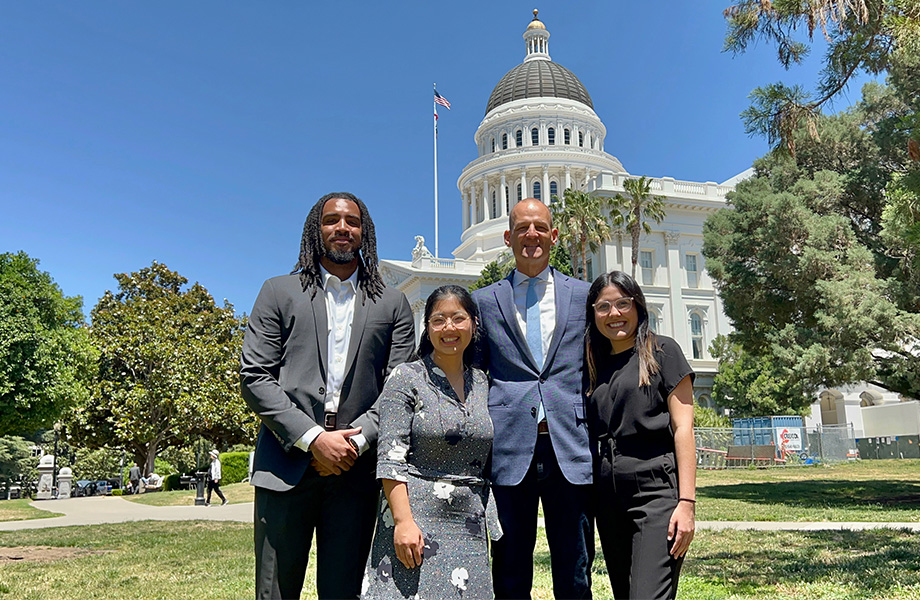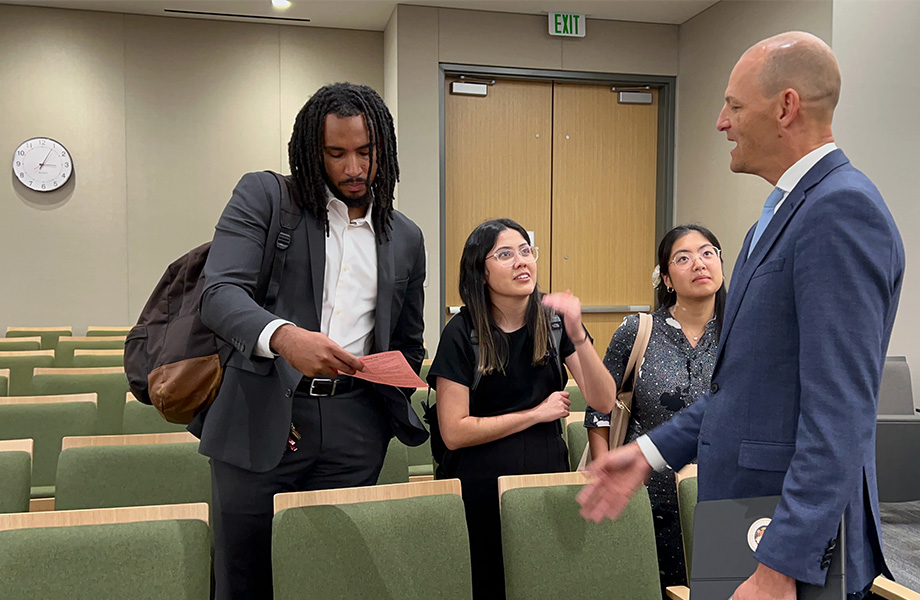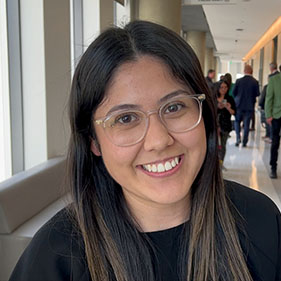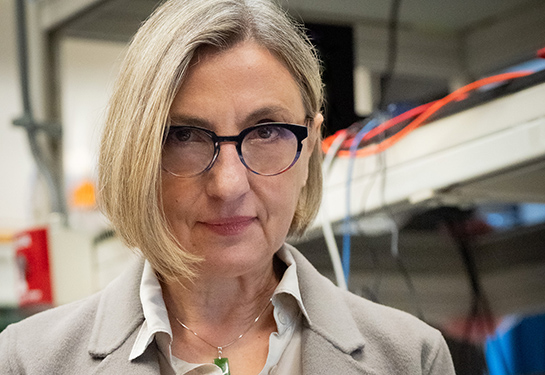School of Medicine prepares students to advocate for patients
New course allows future doctors to shadow legislators to learn how state policy is created
A small group of UC Davis medical students is getting an intimate look at how legislation is created in California’s Capitol.
They are enrolled in a new summer course on health policy and advocacy as part of the School of Medicine’s I-RESTORE pre-clerkship program. The course is considered a selective, which means it’s one of the many options students can choose from for required summer curriculum.
The summer program lasts four weeks. A second, related course also started at the same time but lasts through all four years of medical school as part of the new I-EXPLORE curriculum. It’s called “Area of Scholarly Concentration on Health Policy and Advocacy.”
The new offerings were added to the curriculum to help students fortify their deep desire to learn more about how policy and advocacy can benefit the underserved patients they expect to care for as doctors.
“I hope students gain a deeper understanding of the legislative process and the various ways they can engage in advocacy,” said Juliana Melo, a UC Davis Health obstetrician and gynecologist who created the courses.
Melo, an associate clinical professor in the Division of Family Planning, said she also hopes to help build students’ knowledge and skill set in health policy. That way, she said, “they can harness their passion and energy most effectively to all our benefit.”
The selective is offered specifically for students on their two-month break between the first and second year of medical school.
A highlight of the program is when students shadow lawmakers and learn about the state’s most pressing health issues.

Students shadow Assemblymember Kevin McCarty
On a recent afternoon, the three students in the summer program — Lucas Johnson, Cynthia Sun and Karina Morales — spent an afternoon with Assemblymember Kevin McCarty of Sacramento.
The students met up with McCarty on the Capitol grounds, where he was being interviewed outside for a television news story about gun control legislation.
Following the interview, McCarty greeted the students. “Welcome to the state Capitol,” he said.
“I asked you to come today because we have a health committee hearing where you can see bills and go, ‘Oh, that’s important for Californians.’”
McCarty encouraged the students to ask him questions.
A 196-page committee hearing agenda
“For today’s committee hearing, is there anything that you’re particularly keeping an eye out for?” asked Sun.
McCarty, who is a member of the committee, pulled out his iPhone for the answer from a committee agenda that stretched 196 pages long.
“Do you know what biosimilar drugs are?” he asked the attentive students. “They’re kind of like generic, but kind of like knock off.” He went on to explain that there’s legislation to allow health insurers to provide biosimilar drugs to their enrollees before providing coverage for the equivalent name-brand drug.
Another measure being heard by the committee, he said, would allow Californians to receive two free doses of Narcan, the nasal spray that reverses an opioid overdose, which normally sells for $150 in pharmacies.
Morales asked McCarty for his thoughts on how future physicians can move health care policy forward.
“What you’re doing today,” the lawmaker responded. “Just learning about it and talking about it.”
After their conversation, McCarty guided the students to a Capitol annex building down the street, where they headed into the Assembly Health Committee meeting.

Testimony from a physician
Sun was impressed that the committee members relied on testimony from doctors to make the case for and against legislation.
“We got to hear a lot of really interesting bills go through the first or second pass and we got to hear some expert witnesses, one of which was actually an emergency medicine physician,” she said. “So it was really cool to see how she can use her expertise in medicine to advocate for her patients at the Capitol.”
A week prior, the students spent time with a legislator who is also a physician, Assemblymember Joaquin Arambula from Fresno County.
“When we shadowed Dr. Arambula, we went to the health committee and the higher education committee,” Morales said, “and it was so amazing to see a doctor’s perspective on big things like the budget and how it impacts patients, and how he’s a mentor to us as future physicians.”
Morales said Arambula showed how he can provide input to state lawmakers and also integrate his own personal experience in the process. “A lot of health is determined outside of the clinic and the hospital, so being able to change the structure and infrastructure of the clinic can really prevent patients from getting sick.”
Shadowing McCarty also meant getting a behind-the-scenes look at the legislative process through their huddles with the assembly member before and after meetings.
After the health committee, the students followed McCarty to the Senate Judiciary Committee, which was taking up bills that started in the Assembly. This included hearing from McCarty about his own legislation to ease regulation on the rental car fees collected by the airport.
A lot of our patients, when we see them in clinic, we’re only helping one at a time, and when you get involved in health policy, you’re helping like hundreds, if not thousands of patients all at once, by reducing some of those barriers they face.” —Karina Morales
Lasting lessons motivate students to be advocates
By the end of the afternoon, the students said they gained valuable insight on policy making that encouraged them to be a life-altering voice for their future patients.
“I’m looking for the best ways to become the best advocate I can for patients, both inside the exam room and out of it. I think policy is the best way to do that,” said Lucas Johnson, who is interested in being a primary care physician.
“It was kind of cool to be out and see how the process gets done,” he added. “It’s important that we as emerging physicians know how this process is carried along, and how we can best impact policy and work towards implementing it.”
Sun, who as a young adult is already concerned about the issue of physician burnout, thinks doctors can stay motivated in their careers by getting involved in issues where they can make a difference in helping patients overcome barriers to better health care.
“Physician advocacy is something in your toolbox that can help you fight the good fight and prevent physician burnout,” she said.
Morales said health policy and health advocacy are fundamental to medical education.
“A lot of our patients, when we see them in clinic, we’re only helping one at a time, and when you get involved in health policy, you’re helping like hundreds, if not thousands of patients all at once, by reducing some of those barriers they face.”
She added: “It has been absolutely amazing to have all the support from Dr. Melo and all the Assembly members opening their doors to allow us to come in as the first group from UC Davis to shadow them. And to hear about how we can integrate our expertise into policy making.”




